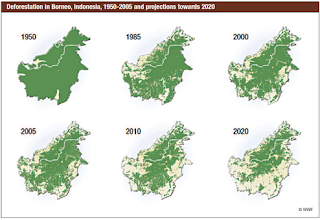 |
| credit: NRDC |
to end all trade in illegal wood products between Asia's largest timber exporter to the European market. The Voluntary Partnership Agreement took six years to negotiate and requires all exported timber products to be certified as harvested in accordance with Indonesian law. The EU banned the sale of illegally harvested timber in March, but the ban required importers to do due diligence to determine if the imports were legally harvested. The new agreement puts the onus on Indonesia to enforce its forest conservation laws since EU importers may now rely on the certification process. Conservationists have expressed guarded optimism that a deal was reached, but note Indonesia has had problems with corruption and lack of effective enforcement of its conservation laws. A spokesman for Greenpeace says as long as companies like Asia Pacific Resources International is allowed to destroy forests rich in biodiversity, Indonesian's green credentials will not be taken seriously. The high profile case of Labora Sitorus, a former cop turned timber smuggler, is testing Indonesian commitment to the rule of law when it comes to a highly profitable black market in timber products. Sitorus is under investigation for involvement with illegal logging in Papua, New Guinea. Without clean enforcement efforts the agreement reached between the EU and Indonesia will not have the intended effect of curbing forest destruction. Ghana, Cameroon, Republic of Congo, Liberia and Central African Republic have also signed similar partnership agreements with the EU, but Indonesia is the largest wood producer to enter into such an agreement so far. Rapid deforestation and peatland destruction have made the country the world's third largest greenhouse gas emitter.